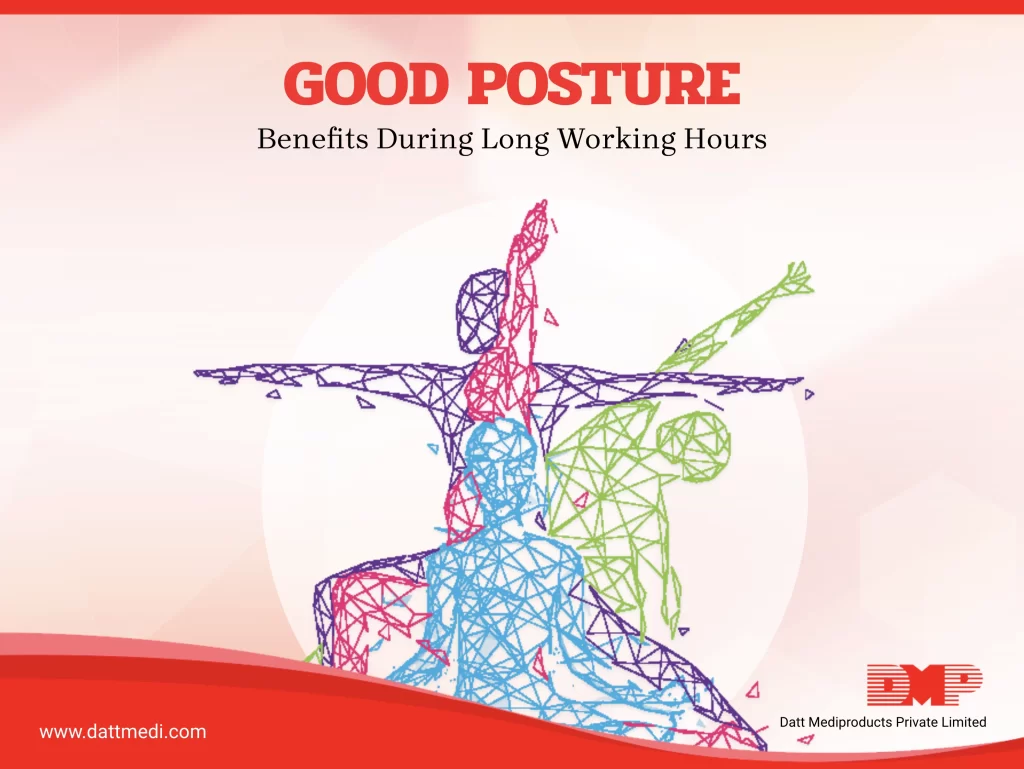
Posture is medically defined as “the carriage of the body as a whole, the attitude of the body, or the position of the limbs (the arms and legs)”. In simple terms it is the body’s position while standing, sitting, lying down, or performing other movements such as bending, lifting, and twisting.
Importance of Good Posture:
Good posture is more than just an appealing look. Often overlooked, it has an abundance of surprising health and wellness benefits. The three natural curvatures (Cervical, Thoracic & Lumbar) of the human spine need to be aligned correctly to ensure even distribution of weight on both the feet. It is important to maintain good posture to ensure the least amount of strain is rested on the joints, muscles, and ligaments of your body.
HEALTH BENEFITS
Back Pain Relief:
Slouching stresses the lower back and pressurizes the posterior structures of the spine viz. intervertebral discs, facet joints, ligaments, and muscles. When you have good posture the spine is supported properly by the muscles, in addition to which bones, joints, ligaments, and other connective tissue also work collectively to keep your back feeling less strained.
Fewer Headaches:
Poor posture builds up muscle tension in the back of the neck contributing to tension headaches. This may also create inflammation, irritating the nerves in the neck and head, leading to symptoms like eye strain, runny nose, and dizziness. Correcting your posture reduces the strain and tension, thereby headaches.
Better Joint Health:
Poor posture, whether standing or sitting, can put your joints under strain. Over a period of time when it becomes chronic, it can lead to some serious injuries such as plantar fasciitis.
Lesser Muscle Strain:
Muscles work more efficiently with good posture. They are not in a constant contraction mode, making them fatigue less and you feel more energetic as well.
Optimal Digestion:
A poor posture makes the shoulders slump and back round, thereby compressing internal organs, pressing it hard for the gastrointestinal tract to function properly causing digestive stress. A good posture aligns your internal organs facilitating the free flow of food and digestive juices.
Comfortable Breathing: Slouching compresses your lungs and intercepts the motion of the diaphragm and ribs needed to fully expand them. A good proper posture helps you breathe more deeply as your lungs have more space to expand.
Confidence Uplift:
Sitting straight and standing tall makes you feel better about your capabilities. It is one of the important ingredients essential for good self-esteem. As per a study published in the European Journal of Social Psychology titled, “Body posture effects on self-evaluation: A self-validation approach”, found that those who sat upright viewed themselves as more confident than those who slouched.
Few Tips from Datt Mediproducts for improving your Posture:
There are a variety of things you can do to improve your posture, including:
– Be conscious about your posture whether sitting or standing, all round the clock.
-Indulge in some kind of physical activity on a regular basis focussing on stretching and core muscle strengthening.
-Maintain a healthy weight.
“A Good Stance and Posture Reflect a Proper State of Mind.”—-Morihei Ueshib




